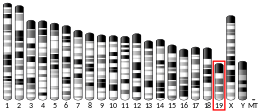DPF2
Zinc finger protein ubi-d4 is a protein that in humans is encoded by the DPF2 gene.[5][6]
The protein encoded by this gene is a member of the d4 domain family, characterized by a zinc finger-like structural motif. This protein functions as a transcription factor which is necessary for the apoptotic response following deprivation of survival factors. It likely serves a regulatory role in rapid hematopoietic cell growth and turnover. This gene is considered a candidate gene for multiple endocrine neoplasia type I, an inherited cancer syndrome involving multiple parathyroid, enteropancreatic, and pituitary tumors.[6]
References[edit]
- ^ a b c GRCh38: Ensembl release 89: ENSG00000133884 – Ensembl, May 2017
- ^ a b c GRCm38: Ensembl release 89: ENSMUSG00000024826 – Ensembl, May 2017
- ^ "Human PubMed Reference:". National Center for Biotechnology Information, U.S. National Library of Medicine.
- ^ "Mouse PubMed Reference:". National Center for Biotechnology Information, U.S. National Library of Medicine.
- ^ Ninkina NN, Mertsalov IB, Kulikova DA, Alimova-Kost MV, Simonova OB, Korochkin LI, Kiselev SL, Buchman VL (Feb 2002). "Cerd4, third member of the d4 gene family: expression and organization of genomic locus". Mamm Genome. 12 (11): 862–6. doi:10.1007/s00335-001-3039-1. PMID 11845289. S2CID 2149578.
- ^ a b "Entrez Gene: DPF2 D4, zinc and double PHD fingers family 2".
Further reading[edit]
- Gabig TG, Mantel PL, Rosli R, Crean CD (1994). "Requiem: a novel zinc finger gene essential for apoptosis in myeloid cells". J. Biol. Chem. 269 (47): 29515–9. doi:10.1016/S0021-9258(18)43910-5. PMID 7961935.
- Chestkov AV, Baka ID, Kost MV, et al. (1997). "The d4 gene family in the human genome". Genomics. 36 (1): 174–7. doi:10.1006/geno.1996.0440. PMID 8812431.
- Guru SC, Agarwal SK, Manickam P, et al. (1997). "A Transcript Map for the 2.8-Mb Region Containing the Multiple Endocrine Neoplasia Type 1 Locus". Genome Res. 7 (7): 725–35. doi:10.1101/gr.7.7.725. PMC 310681. PMID 9253601.
- Gabig TG, Crean CD, Klenk A, et al. (1998). "Expression and chromosomal localization of the Requiem gene". Mamm. Genome. 9 (8): 660–5. doi:10.1007/s003359900840. PMID 9680388. S2CID 22559464.
- Strausberg RL, Feingold EA, Grouse LH, et al. (2003). "Generation and initial analysis of more than 15,000 full-length human and mouse cDNA sequences". Proc. Natl. Acad. Sci. U.S.A. 99 (26): 16899–903. Bibcode:2002PNAS...9916899M. doi:10.1073/pnas.242603899. PMC 139241. PMID 12477932.
- Ota T, Suzuki Y, Nishikawa T, et al. (2004). "Complete sequencing and characterization of 21,243 full-length human cDNAs". Nat. Genet. 36 (1): 40–5. doi:10.1038/ng1285. PMID 14702039.
- Bouwmeester T, Bauch A, Ruffner H, et al. (2004). "A physical and functional map of the human TNF-alpha/NF-kappa B signal transduction pathway". Nat. Cell Biol. 6 (2): 97–105. doi:10.1038/ncb1086. PMID 14743216. S2CID 11683986.
- Beausoleil SA, Jedrychowski M, Schwartz D, et al. (2004). "Large-scale characterization of HeLa cell nuclear phosphoproteins". Proc. Natl. Acad. Sci. U.S.A. 101 (33): 12130–5. Bibcode:2004PNAS..10112130B. doi:10.1073/pnas.0404720101. PMC 514446. PMID 15302935.
- Gerhard DS, Wagner L, Feingold EA, et al. (2004). "The Status, Quality, and Expansion of the NIH Full-Length cDNA Project: The Mammalian Gene Collection (MGC)". Genome Res. 14 (10B): 2121–7. doi:10.1101/gr.2596504. PMC 528928. PMID 15489334.
- Olsen JV, Blagoev B, Gnad F, et al. (2006). "Global, in vivo, and site-specific phosphorylation dynamics in signaling networks". Cell. 127 (3): 635–48. doi:10.1016/j.cell.2006.09.026. PMID 17081983. S2CID 7827573.
External links[edit]
- DPF2+protein,+human at the U.S. National Library of Medicine Medical Subject Headings (MeSH)
This article incorporates text from the United States National Library of Medicine, which is in the public domain.





